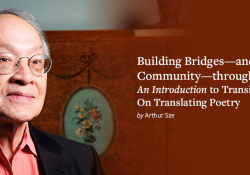Are Translators Necessary? A Case Against AI

Do we want to live in a society in which humans are increasingly pushed aside, de-skilled, and demoralized? The author looks at literary translation as a test case to find out.
An article appeared in the November 11, 2024, online edition of the Guardian newspaper under the title “‘It gets more and more confused’: Can AI replace translators?” The occasion for the article was the announcement that Dutch publisher Veen Bosch & Keuning (VBK) would use AI translation for what it termed “commercial fiction”—that is, presumably, entertaining fiction that has a potentially wide readership but does not aspire to high art. In response to translator and author criticism, the publisher stated that AI would be used only with the author’s permission. A VBK spokesperson quoted in a previous Guardian article had further specified, “There will be one editing phase, and authors have been asked to give permission for this. We are not creating books with AI, it all starts and ends with human action,” a brilliantly nonsensical statement. According to the VBK’s commercial director,
This project contains less than ten titles—all commercial fiction. No literary titles will nor shall be used. This is on an experimental basis, and we’re only including books where English rights have not been sold, and we don’t foresee the opportunity to sell English rights of these books in the future. (emphasis mine)
As the Guardian article of November 4 points out, in May 2024 VBK was bought by Simon & Schuster (S&S), an American megapublisher. Significantly, according to The Bookseller, this was S&S’s “first acquisition of a non-English publisher.” Not mentioned, however, was that S&S had in turn been bought by the investment firm of Kohlberg Kravis Roberts. In other words, S&S is now responsible for generating profits for KKR.
These days, companies use AI to produce a product (in this case a translation) as quickly and cheaply as possible in order to maximize profit for their stockholders. The increased profit in this instance comes at the expense of human translators, as I will make clear later. This cost-cutting of labor alone should give us pause, because it exemplifies the overall process by which wealth is being pumped upward to the owners of media and tech companies. The spectacle of five tech multibillionaires sitting on the stage at the Trump inauguration should tell us what this process is all about: the consolidation of wealth and power in the hands of the few. But here I will limit myself to translation-related issues.
The phrase “on an experimental basis” deserves special attention. A publisher that wanted to try AI just to see what happened (as I might run a challenging text through DeepL or Google Translate after I had finished with it to see what came out) would probably not announce it. It is hard not to see this as part of a larger picture. According to an April 6, 2024, article in the New York Times:
At Meta, which owns Facebook and Instagram, managers, lawyers and engineers last year discussed buying the publishing house Simon & Schuster to procure long works, according to recordings of internal meetings obtained by the Times. . . .
Ahmad Al-Dahle, Meta’s vice president of generative A.I., told executives that his team had used almost every available English-language book, essay, poem and news article on the internet to develop a model, according to recordings of internal meetings, which were shared by an employee.
Meta could not match ChatGPT unless it got more data, Mr. Al-Dahle told colleagues. In March and April 2023, some of the company’s business development leaders, engineers and lawyers met nearly daily to tackle the problem.
Some debated paying ten dollars a book for the full licensing rights to new titles. They discussed buying Simon & Schuster, which publishes authors like Stephen King, according to the recordings. (emphases mine)
Many of us have assumed that literary translation would be off-limits to AI because of the required stylistic and emotional complexity. However, as we have seen, larger and more powerful players than S&S and KKR—players that are directly engaged in the development of AI and have spent hundreds of millions of dollars on research and development—are playing a strategic long game. At issue is the push to reduce dependence on expensive, highly skilled human labor and to reduce all qualities to calculable quantities in as many areas as possible. If this effort is successful, authors and translators, including literary translators, are likely to become victims of the corporate mindset.
Many of us have assumed that literary translation would be off-limits to AI because of the required stylistic and emotional complexity.
In effect, we are seeing what might be termed digital Fordism. Fordism was the process—named after Henry Ford and begun at the turn of the last century—by which skilled mechanics who built cars became assembly-line workers in the name of standardization and efficiency. The skills they had honed through years of experience were no longer needed, resulting in progressive de-skilling. But discontent was high, approaching 400 percent turnover per year, so Ford increased wages ($5.00 for an eight-hour day, up from $2.34 for a nine-hour day). But no increases will be given to translators, as the object is now to reduce dependency on them. Whatever benefits flow from standardization and efficiency, one must ask how they compare to the loss of professional skill, experience, and the pride and independence these confer on the individual.
* * *
Some twenty-five years ago, developers of so-called translation memory tools, such as Trados, assured translators that their products were designed merely to assist translators of commercial and technical texts. These tools would simply supply suggestions gleaned from a corpus of translations, either from the previous work of the translators themselves or from translation agencies a corporate client had hired to produce the translation. There was nothing to worry about, we were told. “Jump in, the water’s warm,” I once heard. But while such assistance seemed, at first, a convenience for many translators, it soon emerged that translation agencies were using these tools to control the translation process. Eventually they began forcing translators to use them. Naturally, per-word rates decreased because, it was claimed, translation memory tools made the process of translation faster. But greater speed often came at the cost of quality, as these tools trained translators to be satisfied with “good enough” translation. The reason is that while machine-generated output is often comprehensible, it is not necessarily optimal, and it is simply easier to let those formulations pass. This became a problem, leaving some agency heads to ask what to do about “80-percent quality.” The water got considerably chillier.
In effect, translators are becoming mere auxiliary components of a translation machine. That is digital Fordism. And, of course, jobs in whole-text translation—that is, of texts the translator works through from beginning to end—are becoming scarcer and less satisfying. An August 26, 2024, article in Slator (which bills itself as “Language Industry Intelligence”), reporting on a survey it conducted of 260 “linguists,” claimed that “over 50 percent of freelance linguists have thought about changing career.” I suspect the crisis of economic precarity and work satisfaction has hit translators much harder than interpreters, at least for now, but this is difficult to know, as the Slator report does not distinguish between interpreters and translators. Slator, always a cheerleader for industry consolidation and AI, might disaggregate that for me—if I were willing to shell out $260 for their eighty-page “Slator Pro Guide: The Future of Language Industry Jobs.”

Once it recognized the profit potential, the corporate translation industry began to consolidate.
Once it recognized the profit potential, the corporate translation industry began to consolidate. Venture capitalists and private-equity firms invested large sums of money in it and wanted to see hefty returns on their investments. I began to chronicle this process as an exercise in 2015 in “A Timeline of RWS Acquisitions,” and I offer one illustrative example here.
The process of mergers and acquisitions eventually resulted in the creation of a few mega-agencies called language service providers (LSPs). (The transition from bureau to agency to LSP deserves examination.) With massive infusions of capital, LSPs bought up smaller translation and other companies whose specializations gave them a competitive edge. In 2015 RWS Group—a large translation agency based in England—bought Corporate Translations, Inc., a small and respected Connecticut medical translation agency, for $70 million. That was just the beginning; two years later it bought Czech-based Moravia for $320 million, and onward and upward. By June 2017 RWS Group announced that it would replace its more than one hundred internal translators with posteditors of machine translation because “they are our most expensive resources.” This is digital Fordism. By that time, the true nature of the push for machine translation should have been evident to all—if translators had let themselves realize it was happening and acknowledged it.
The corporatization of translation has had another ill effect on translators and on texts. Like any discipline pursued seriously, the translation of complex texts by a dedicated translator has the potential to be transformative. Translators who engage with, say, legal or scientific texts absorb and learn to reproduce ways of thinking that can shape and influence their own thinking as well. This is not only because of the research that necessarily goes into making an expert translation, as Michele Hutchison points out in the Guardian article cited above, but even more so because of the translator’s relationship with the text and its message. This process of engagement becomes greater with each subsequent translation of whole text in which the translator grapples repeatedly with the problem of conveying the conventions, modes, and expectations of one language into another.
The translation of complex texts by a dedicated translator has the potential to be transformative.
In 2011, at a conference of the New England Translators Association, I asked Alon Lavie—a proponent of machine translation featured as a speaker, and now a researcher and adviser in AI—the following question: “Is there anything about MT (machine translation) that would enable translators to develop the higher skills needed to translate more demanding material?” His answer was telling: “I don’t think there’s anything; but I’m not sure there’s anything in TMT (translation memory tools) either.” Translation memory tools, he continued, are little more than machine translation lite.
Lavie had inadvertently admitted that reliance on machine translation (and by extension AI) would have a de-skilling effect on translators, by short-circuiting the direct, intense engagement by which translators can develop ever-increasing levels of understanding and expertise. Proponents argued that this deficit would be made up for by improvements in the technology and by enlisting translators as posteditors of machine output, as happened at RWS. But there is a vast difference between grappling with the sweep and complexity of ideas present in whole text, and ferreting out and correcting superficial or subtle errors of grammar, voice, and vocabulary in a text with which one is not deeply familiar, and to which one’s mind has not been fully committed from the outset.
Characteristically, Slator labels the process of conforming to corporate requirements “upskilling”:
In response to the evolving market, linguists are actively upskilling. A third of those who participated in the survey acquired new skills in AI over the previous year, and 45 percent increased their subject matter knowledge.
Tasks for which linguists are being hired other than machine translation post-editing (MTPE) include AI prompting, terminology management, data management, and categorizing, labeling, and annotating data to train large language models (LLMs).
Not one of the “tasks” that Slator cites, including postediting, is in fact translation. They are all mechanical components or functions of data processing, of a digital assembly line—qualities turned into quantities. Those trained in these “tasks” will probably find it more difficult to gain the skills needed for more complex, whole translation.
Slator also glossed over the very justified concerns of the Société française des traducteurs about the use of AI in a July 3, 2024, article, focusing mainly on the undeniable loss of work for translators. The society’s statement, however, made the following crucial point:
Generative AI tools like ChatGPT, which was released in 2023, are statistical estimation software. They are fascinating because of their high speed and naturalness in response, suggesting quality. However, on closer inspection, a native speaker or an experienced professional will quickly notice awkwardness, semantic changes, even contradictions or omissions. More seriously, generative AI produces partially or wholly false information by presenting it as true, because it prefers to “hallucinate” when it lacks data, rather than remain mute. (emphasis in original)
Generative AI hallucinates because it cannot ask critical questions. Quality is impossible in the absence of thinking.
I have often wondered whether an fMRI (functional magnetic resonance imaging, which measures oxygen uptake) would light up different areas of the brain in a person engaged in whole-text translation and one picking apart a preexisting text for errors and infelicities. I suspect it would. Perhaps such testing has already been conducted. If not, it should be.
There is also the well-known tendency, not only in translation, to become inured to formulations that are less than optimal and may even be wrong. But the problem goes well beyond that. AI will probably lead to further de-skilling, as young people in particular use it to produce essays and other texts that appear almost human but require little or no proficiency or knowledge to produce. Against what will they judge what AI has coughed up? On what basis will they even try to make such judgments? And what might be the cumulative effect of AI on the way language is used in society? Will it contribute to the ways in which language and communication evolve in an ever-changing world? Or will it eventually limit what can be thought and written and said? These are questions beyond the scope of this essay, but they need to be addressed.
What might be the cumulative effect of AI on the way language is used in society?

* * *
The transformative potential of translation in general applies powerfully to literary translation in particular. In my own experience—which includes the translation of scholarly works, diaries, and large bodies of nineteenth- and twentieth-century letters—I have sometimes felt as though I were a guest in the mind of the author, trying to identify with and emulate his or her thought processes. With a living author, this constant back-and-forth clarifies not only my own understanding but usually that of the author as well. Because of this, a translation may diverge, often to its advantage, from the original work. That process of clarification is the result of the translator’s commitment to the text and to the author. Three drafts are not uncommon. The prescription of a single edit, such as VBK proposes, is ludicrous. Responsible and responsive literary translation is a lot of work. The alliance that forms between author and translator can be profound; in one case of mine, it grew into a relationship lasting more than twenty years. How likely is it that a posteditor—processing machine output at a lowered pay rate—will develop such a commitment to a piece of work, to the person who produced it, or to the opportunity for personal growth?
This question—of identification and interrogation as essential aspects of translation—is not limited to living authors. I once translated some 450 letters written in the 1880s between a young governess in Constantinople and her mother in Pforzheim, Germany. Part of my task was to feel my way into the mind of a nineteen-year-old woman from another era living in a place and situation that was totally foreign to me—and to her, too, as she tried to adapt. To that end and others, I read one of the potboilers that she mentioned as having been a consolation when she felt discouraged (Eugène Sue’s The Mysteries of Paris). It nurtured the hope that her true nobility would be discovered. Such identification with a person no longer living closely mirrors the processes of mentalization by which we intuit the thought-based and emotional worlds of others. The ability to do this is the basis for empathy, without which relationship and understanding—and, I would add, meaningful translation of personal material—are impossible.
It calls for an act of imagination that is informed by an ever-finer image of the writer, elaborated over time and with the engagement that characterizes deep translation. Did my image of this young woman bear any resemblance to the actual person? There is no way to know, and another translator might well have pulled out different qualities from the letters. Still, I would like to think that both of our translations would be more vibrant, and truer to her experience, as a result of our efforts.
AI programs cannot reflect on personal experience and development because they have undergone neither. And because they rely on algorithmic logic to make it look “as if,” they necessarily undermine human agency.
This understanding of translation, which proceeds from the perspective of the human translator, is fundamentally incompatible with the profit motive of corporations. Translators, of course, need to be paid. But unlike Henry Ford, who had to increase pay to keep the assembly lines humming, I see no evidence of such a move among the digital Fordists. Translators are simply being eliminated.
The push to sideline human beings goes well beyond translators. While revising this essay, I received the following in an email from a historian friend in Germany:
I attended a lecture on “AI in university teaching” last week, and the lecturer (of informatics) had no idea about the work a human or social scientist does. He was totally ok with AI writing the “texts” from scratch, especially for students. His own ideas were more about the “scientific” level of sciences. I was quite shocked. That means that there is no need for historians any more. . . . It will be hard work to convince people in (financial) power about the relevance of humanities!
Certainly it is not the duty of a corporation to provide translators (or anyone else) with growth experiences, but here is the underlying question: Do we want to live in a society in which humans are increasingly pushed aside, de-skilled, and demoralized? We have seen how translated texts and those who translate them are diminished by the limitations of algorithmic technology. But in counting our losses, let us not forget the readers, the broad audience for whom both authors and translators work. Will they get used to the “flattening out” that machine translation and AI enforces because it is based on statistical estimates? Will they become less skilled and discerning readers as a result? Will understanding be further eroded? We don’t know, but it looks as though we are about to find out.
Cambridge, Massachusetts
Editorial note: Licensed by Kenneth Kronenberg under a Creative Commons Attribution–Noncommercial–No Derivative Works 4.0 License, 2025.










